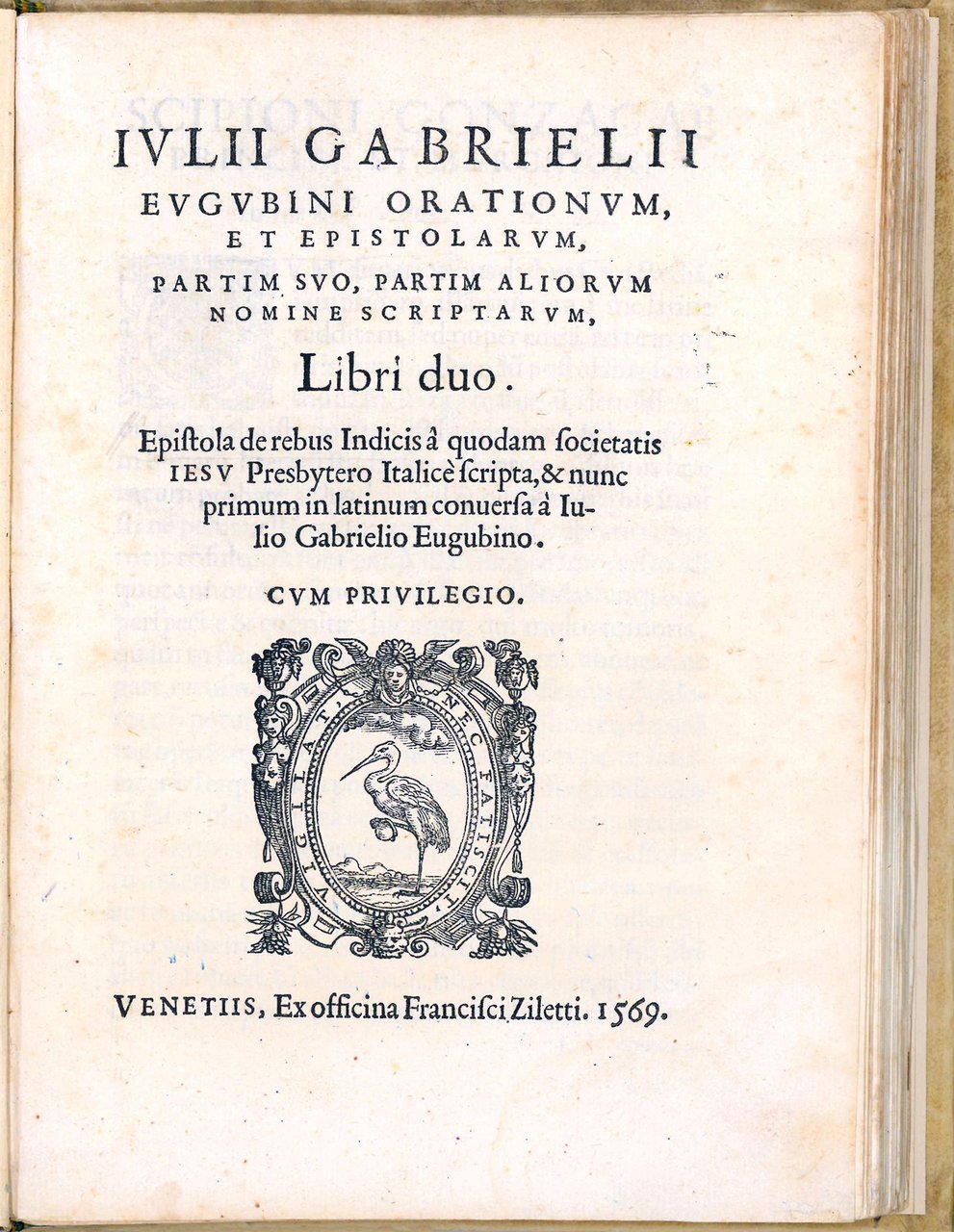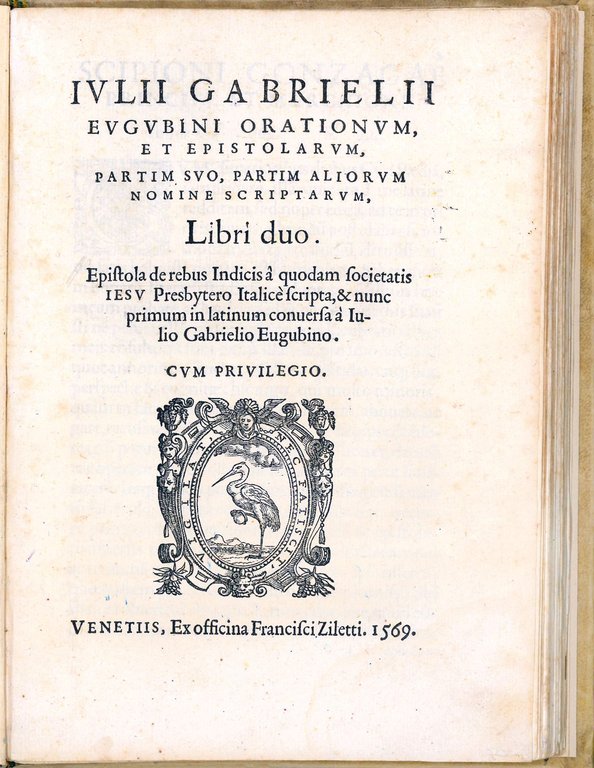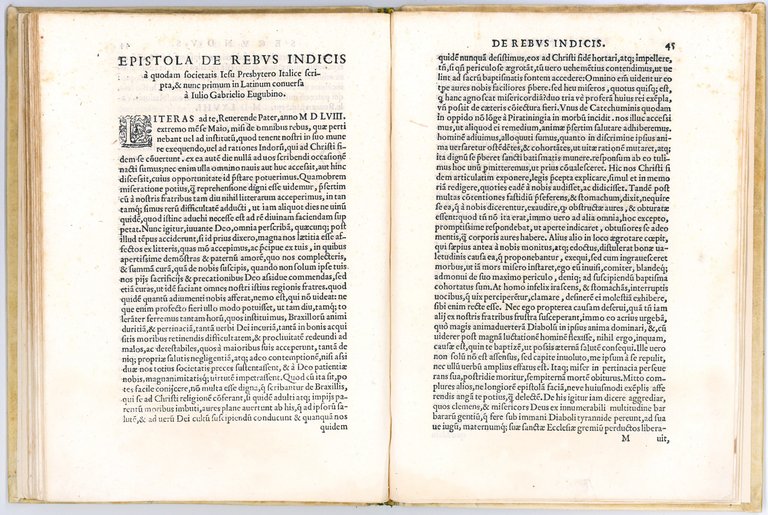Iulii Gabrielii Eugubini Orationum, et Epistolarum, partim suo, partim aliorum nomine scriptarum, libri duo. EPISTOLA DE REBUS INDICIS a quodam Societatis Iesu Presbytero Italice scripta, et nunc primum in Latinum conversa a Iulio Gabrielio Eugubino
Iulii Gabrielii Eugubini Orationum, et Epistolarum, partim suo, partim aliorum nomine scriptarum, libri duo. EPISTOLA DE REBUS INDICIS a quodam Societatis Iesu Presbytero Italice scripta, et nunc primum in Latinum conversa a Iulio Gabrielio Eugubino | Livres anciens et modernes | GABRIELLI, Giulio (d. 1579)-[ANCHIETA, José de (1534-1597)]
Iulii Gabrielii Eugubini Orationum, et Epistolarum, partim suo, partim aliorum nomine scriptarum, libri duo. EPISTOLA DE REBUS INDICIS a quodam Societatis Iesu Presbytero Italice scripta, et nunc primum in Latinum conversa a Iulio Gabrielio Eugubino
Iulii Gabrielii Eugubini Orationum, et Epistolarum, partim suo, partim aliorum nomine scriptarum, libri duo. EPISTOLA DE REBUS INDICIS a quodam Societatis Iesu Presbytero Italice scripta, et nunc primum in Latinum conversa a Iulio Gabrielio Eugubino | Livres anciens et modernes | GABRIELLI, Giulio (d. 1579)-[ANCHIETA, José de (1534-1597)]
Mode de Paiement
- PayPal
- Carte bancaire
- Virement bancaire
- Pubblica amministrazione
- Carta del Docente
Détails
- Année
- 1569
- Lieu d'édition
- Venezia
- Auteur
- GABRIELLI, Giulio (d. 1579)-[ANCHIETA, José de (1534-1597)]
- Éditeurs
- Francesco Ziletti
- Thème
- Quattro-Cinquecento
- Etat de conservation
- En bonne condition
- Langues
- Italien
- Reliure
- Couverture rigide
- Condition
- Ancien
Description
JESUITS AND CALVINISTS IN 16TH-CENTURY BRAZIL
4to (202x144 mm). 52 leaves. Collation: A-N4. Printer's device on title page. Modern flexible vellum with inked title on spine. Some light foxing and marginal staining. A good copy.
Rare first edition dedicated to Scipione Gonzaga. The work, divided into two books, contains a various orations, one of which was read at the Council of Trent in 1562 in the presence of Pope Pius IV, and another addressed to the consuls of Gubbio, as well as a series of letters written on behalf of Cardinal Ercole Gonzaga, of whom Gabrielli was secretary, and addressed to high prelates (such as Marcello Cervini, future Pope Marcellus II) and princes. The volume also includes some family letters addressed by the author to his brothers and some friends.
Gabrielli, an ecclesiastical philosopher, orator and man of letters, as well as a great connoisseur of Latin and Greek, translated Xenophon, Plutarch and Gregory Nazianzen. He took part in the Council of Trent as secretary to Cardinal Ercole Gonzaga. He died in 1579 in Gubbio, his hometown.
The last seventeen pages of the book are occupied by the Latin translation of a letter from a Jesuit whose name is not given. The letter, translated from Italian, is dated São Vicente, 1 June 1560. This letter, which is preserved in the Spanish original in the Archivium Romanum Societatis Jesu, was first printed in Italian in the collection Nuovi avisi dell'Indie di Portogallo (third part, Venice, 1562). It was never published at the time in Spanish or Portuguese (see S. Leite, Monumenta Brasiliae, Rome, III, 1958, pp. 246-269). It was written by José de Anchieta, also called the Apostle of Brazil, because he was the co-founder of the cities of São Paulo and Rio, the fifth Provincial of Brazil and the first scholar of the Tupi language, of which he wrote a grammar and a dictionary (cf. Leite, op. cit., II, 1957, pp. 67*-71*). John Paul II beatified him in 1980.
This very important report, the result of direct and deeply suffered knowledge, was sent to Rome to Father Diego Laynez, second general of the Society and one of St. Ignatius' first collaborators. Anchieta, who belonged to a group of Jesuits stationed in Piratininga (São Paulo) under the leadership of Father Luis de Grã (Granius), tells of the immense physical and moral effort that had to be made to convert the Indians and to persuade them to baptise their many children (often born half alive because of the abortion practices that were widespread among the indigenous women). He advocated the creation of villages (aldeias) -something that was systematically done with the support of Governor Mem de Sà-, to which the Indians could be brought for easier indoctrination.
He then goes on to say that Father Alfonso Bràs (Blasius), with untiring zeal, helped to build brick houses, attracting many natives, especially women, to populate the village. The natives practised cannibalism on prisoners captured in battle. These were slaughtered, after complex ceremonies, with a ritual blow from a stick vibrated from behind. The abortion, cannibalism and sexual practices of the Indians weigh heavily on the heart of the author, who also reports on the partial and temporary successes of the fathers. Young men educated in the village Christian school, for example, transform themselves at puberty by becoming worse than their fathers, getting drunk and indulging in lust.
One of the climaxes of the story comes when four Frenchmen arrive in the village with a group of Tamoio Indians. They were Calvinists sent by Calvin himself at the request of the French commander Nicolas Durand de Villegagnon, who had founded the colony of “France antartique” on a small island in the bay where Rio now stands. The island was fortified and named Fort Coligny. One of the four Frenchmen whose name Anchieta does not mention, although he describes him in great detail, is Jean Cointa, sieur de Boulez, an adventurer, scholar and theologian. His heterodox views





